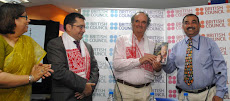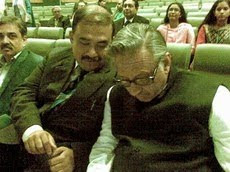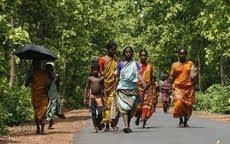 deference to historical and geographical realities, but not at the cost of crucial national interests. India dominates the political debate in many ways in any parliament poll in Bangladesh.
deference to historical and geographical realities, but not at the cost of crucial national interests. India dominates the political debate in many ways in any parliament poll in Bangladesh.On the other hand, when India's northeast goes to polls - as it will during the forthcoming national parliament elections - the "Bangladesh factor" sits heavy on the campaign .
Right-wing Hindu nationalist parties like the BJP have started attacking the Congress - India's ruling party and also in power in a number of northeastern states - for pandering to so-called illegal migration from Bangladesh. In Assam, the BJP's electoral ally, the Asom Gana Parishad (AGP) has joined the tirade against the Congress. The AGP is made up of the erstwhile student leaders who led the intense campaign against Bangladeshi illegal migration in the earlky 1980s. So it is only to be expected that they will raise the Bangladesh infiltration issue in a huge way.
 "The Congress has played the politics of the Bangladeshi votebanks for sixty years now. This time , it will not work," says AGP chief Chandra Mohan Patowary. Patowary expects - though he will not publicly admit it - that the AGP-BJP alliance , whose ideological cement is the Bangladesh infiltration issue, will consolidate the Hindu vote - Bengali and Assamese Hindus will largely vote for them, as would some of the tribes who are upset with land loss to Muslim migrants from Bangladesh.
"The Congress has played the politics of the Bangladeshi votebanks for sixty years now. This time , it will not work," says AGP chief Chandra Mohan Patowary. Patowary expects - though he will not publicly admit it - that the AGP-BJP alliance , whose ideological cement is the Bangladesh infiltration issue, will consolidate the Hindu vote - Bengali and Assamese Hindus will largely vote for them, as would some of the tribes who are upset with land loss to Muslim migrants from Bangladesh.The Congress is quick to shoot back. "We only protect Indian Muslims but we are against infiltration from Bangladesh," says Assam chief minister Tarun Gogoi.
He says the Congress is a national party and it is its job to protect all kinds of linguistic and religious minorities.
"We cannot surrender our long tradition of secularism. The BJP is communal and its alliance with the AGP is opportunistic," Gogoi alleges.
 But the Congress, largely on Gogoi's insistence, has stayed away from a proposed seat-sharing alliance with the minority party, Assam United Democratic Front (AUDF) .
But the Congress, largely on Gogoi's insistence, has stayed away from a proposed seat-sharing alliance with the minority party, Assam United Democratic Front (AUDF) .According to senior Congress sources , Gogoi was locked in a heated exchange with senior leaders like foreign minister Pranab Mukherji who wanted an alliance with the AUDF because the minority group, which won ten seats in the 2006 Assam state polls, is seen as capable of cutting into the minority votebank of the Congress and causing its defeat in quite a few of the total 14 parliament seats in Assam.
"Gogoi knows that an alliance with the AUDF may get the Congress a few seats in areas dominated by migrants from what is now Bangladesh but it will adversely impact on the sentiment of the ethnic Assamese. Gogoi wants to project the Congress as a party of the Assamese to neutralise the campaign of the BJP and the AGP ," says political analyst Nani Gopal Mahanta.
 Muslims constitute more than 30 percent of Assam's population - most of whom are migrants from erstwhile East Bengal , now Bangladesh.
Muslims constitute more than 30 percent of Assam's population - most of whom are migrants from erstwhile East Bengal , now Bangladesh.Mahanta says that these migrants - new and old - are a decisive factor in nearly one-third of the Assam's 126 state assembly seats.
But that's precisely why the ethnic Assamese are so upset with the migrants .
But it is not just the fears of continued illegal migration from Bangladesh that makes it such a big factor in polls in India's northeast.
Rebel groups from the region have allegedly found shelter in Bangladesh in recent years and even the country's new Awami League has admitted to the presence of these groups in Bangladesh soil.
But that's precisely why the ethnic Assamese are so upset with the migrants .
But it is not just the fears of continued illegal migration from Bangladesh that makes it such a big factor in polls in India's northeast.
Rebel groups from the region have allegedly found shelter in Bangladesh in recent years and even the country's new Awami League has admitted to the presence of these groups in Bangladesh soil.
 The Congress , keen to play down the illegal migration issue, plays up the Bangladesh card in a different way.
The Congress , keen to play down the illegal migration issue, plays up the Bangladesh card in a different way."All our rebels are based in Bangladesh. The new government there must throw them out and we want Delhi to pressurise Dhaka to stop sheltering these rebels," says chief minister Tarun Gogoi.
Tripura leftist chief minister Manik Sarkar, again a target of BJP criticism for the Left's alleged encouragement to illegal migration from Bangladesh, joins issue with Tarun Gogoi.
"Our states gave shelter to millions of Bangladeshis during the country's freedom struggle from Pakistan. We made all the sacrifice. The least we can expect is that Bangladesh will not shelter our trouble-makers," said Sarkar.
 In Meghalaya, a tribal state, "infiltration from Bangladesh" is again a big issue. A local council even announced rewards for Khasi tribal mothers if they gave birth to fifteen children or more.
In Meghalaya, a tribal state, "infiltration from Bangladesh" is again a big issue. A local council even announced rewards for Khasi tribal mothers if they gave birth to fifteen children or more."That is the level of paranoia about infiltration from Bangladesh," says Meghalaya's social activist and editor Patricia Mukhim.
Local parties , like the AGP in neighbouring Assam, are hyped up about "infiltration" from Bangladesh. As are the smaller tribal parties in Tripura .
"Migration from East Pakistan, now Bangladesh, has turned us into foreigners in our own homeland," says Rabindra Debbarma, general secretary of the Indigenous National Party of Tripura (INPT).
The BJP and the regional parties play up the migration issue from Bangladesh. The Congress and the Left plays up the issue of local insurgents getting shelter in Bangladesh. Either way, the Bangladesh factor looms large on the polls in Northeast - including the forthcoming parliamentn polls.
There are a total of 24 parliament in India's northeast - fourteen of them in Assam.
In the kind of tough competition between the Congress-led UPA alliance and the BJP-led NDA alliance that's forecast by pre-poll surveys, every seat is going to count.
So even the big national parties are campaigning heavily in northeast and working the right kind of alliances with local parties.
And the "Bangladesh factor" is coming up in the campaign all across Northeast in a big way.
The BJP and the regional parties play up the migration issue from Bangladesh. The Congress and the Left plays up the issue of local insurgents getting shelter in Bangladesh. Either way, the Bangladesh factor looms large on the polls in Northeast - including the forthcoming parliamentn polls.
There are a total of 24 parliament in India's northeast - fourteen of them in Assam.
In the kind of tough competition between the Congress-led UPA alliance and the BJP-led NDA alliance that's forecast by pre-poll surveys, every seat is going to count.
So even the big national parties are campaigning heavily in northeast and working the right kind of alliances with local parties.
And the "Bangladesh factor" is coming up in the campaign all across Northeast in a big way.
(Subir Bhaumik is the BBC's East India Correspondent and a known Northeast India and Bangladesh specialist)







